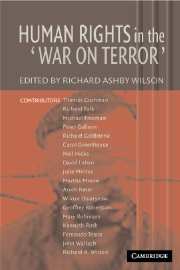Book contents
- Frontmatter
- Contents
- List of Contributors
- Acknowledgements
- HUMAN RIGHTS IN THE ‘WAR ON TERROR’
- Introduction
- 1 Order, Rights and Threats: Terrorism and Global Justice
- 2 Liberal Security
- 3 The Human Rights Case for the War in Iraq: A Consequentialist View
- 4 Human Rights as an Ethics of Power
- 5 How Not to Promote Democracy and Human Rights
- 6 War in Iraq: Not a Humanitarian Intervention
- 7 The Tension between Combating Terrorism and Protecting Civil Liberties
- 8 Fair Trials for Terrorists?
- 9 Nationalizing the Local: Comparative Notes on the Recent Restructuring of Political Space
- 10 The Impact of Counter Terror on the Promotion and Protection of Human Rights: A Global Perspective
- 11 Human Rights: A Descending Spiral
- 12 Eight Fallacies About Liberty and Security
- 13 Our Privacy, Ourselves in the Age of Technological Intrusions
- 14 Are Human Rights Universal in an Age of Terrorism?
- 15 Connecting Human Rights, Human Development, and Human Security
- 16 Human Rights and Civil Society in a New Age of American Exceptionalism
- Index
- References
12 - Eight Fallacies About Liberty and Security
Published online by Cambridge University Press: 18 August 2009
- Frontmatter
- Contents
- List of Contributors
- Acknowledgements
- HUMAN RIGHTS IN THE ‘WAR ON TERROR’
- Introduction
- 1 Order, Rights and Threats: Terrorism and Global Justice
- 2 Liberal Security
- 3 The Human Rights Case for the War in Iraq: A Consequentialist View
- 4 Human Rights as an Ethics of Power
- 5 How Not to Promote Democracy and Human Rights
- 6 War in Iraq: Not a Humanitarian Intervention
- 7 The Tension between Combating Terrorism and Protecting Civil Liberties
- 8 Fair Trials for Terrorists?
- 9 Nationalizing the Local: Comparative Notes on the Recent Restructuring of Political Space
- 10 The Impact of Counter Terror on the Promotion and Protection of Human Rights: A Global Perspective
- 11 Human Rights: A Descending Spiral
- 12 Eight Fallacies About Liberty and Security
- 13 Our Privacy, Ourselves in the Age of Technological Intrusions
- 14 Are Human Rights Universal in an Age of Terrorism?
- 15 Connecting Human Rights, Human Development, and Human Security
- 16 Human Rights and Civil Society in a New Age of American Exceptionalism
- Index
- References
Summary
We often hear it said that in times of danger we confront difficult trade-offs between national security and civil liberties, or between national security and human rights. We nod our heads, and reflect that tough times call for tough measures. An American official, commenting on the harsh and even brutal techniques that U.S. interrogators use on suspected terrorists, put it bluntly. “If you don't violate someone's human rights some of the time, you probably aren't doing your job” (Priest & Gelman 2002). While some people might find such talk appalling, others find it realistic, tough-minded, and oddly reassuring. We face terrible threats posed by ruthless international terrorists who have already proven themselves eager for mass murder – and who may well gain access to weapons of apocalyptic power. Confronted with these threats, excessive concern with human rights and civil liberties seems legalistic and, however well-meaning it is, misguided. Trade-offs are inevitable, and the only important question then becomes where to draw the line. How much liberty should be sacrificed in the name of security? How many human rights can we afford to respect?
The constitutional scholar John Hart Ely once remarked that no answer is what the wrong question begets (Ely 1980: 72). In this chapter, I argue that the questions in the last paragraph are the wrong ones to ask; unfortunately, it is not non-answers they beget, but wrong answers.
- Type
- Chapter
- Information
- Human Rights in the 'War on Terror' , pp. 242 - 257Publisher: Cambridge University PressPrint publication year: 2005
References
- 24
- Cited by



